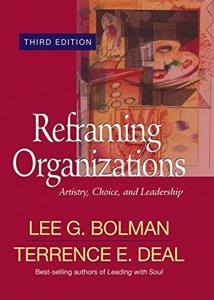
Want to learn the ideas in Reframing Organizations better than ever? Read the world’s #1 book summary of Reframing Organizations by Lee G. Bolman, Terrence E. Deal here.
Read a brief 1-Page Summary or watch video summaries curated by our expert team. Note: this book guide is not affiliated with or endorsed by the publisher or author, and we always encourage you to purchase and read the full book.
Video Summaries of Reframing Organizations
We’ve scoured the Internet for the very best videos on Reframing Organizations, from high-quality videos summaries to interviews or commentary by Lee G. Bolman, Terrence E. Deal.
1-Page Summary of Reframing Organizations
Overview
Executives and managers are usually very passionate about their work, but it’s not enough to ensure the company’s success. A lot of times, companies face problems that need to be addressed immediately. Executives might not know what they should do in those situations because they don’t have all of the information yet.
The key points to learn from are that restructuring is necessary for businesses of all sizes. We can learn from the knowledge of others and what they’ve done in their business, but sometimes it’s best to learn by doing. Profit is at stake when we don’t make the right decisions, so let’s find out how to do that with this guide on restructuring your company.
In this article, you will learn how Whole Foods organizes their stores and why. You’ll also find out about a respected company that started off as just an idea on a napkin. Additionally, you’ll read about a major auto firm’s CEO who realized it was better to own up to past mistakes.
Big Idea #1: Mistakes are made when complexity is simplified. The trick is to question your prejudices.
Problem-solving is a skill that we all need to use at some point in our lives. It can be relatively easy, such as when you’re figuring out how to get home for Christmas. However, it’s much more difficult when you’re trying to solve complex problems. People often make the mistake of simplifying complexity, but this leads to mistakes and bad decisions if you’re a leader or manager.
In some cases, leaders oversimplify complicated situations by focusing on only the most critical information. Other times, they make assumptions about complex issues without looking at them directly.
The authors believe that President Donald Trump’s actions are a good example of simplified prejudice. In March 2017, he tweeted repeatedly that Barack Obama had tapped his phones during the lead-up to the 2016 election. He received this faulty information from the far-right news outlet Breitbart. However, upon investigation, it was proven that Obama had ordered nothing of the sort. This case is hardly unique; many people have formed first impressions based on false or incomplete information and then stubbornly clung to them even after being presented with facts disproving their initial conclusion.
In 2011, a neuroscientist conducted a study that showed we tend to disregard information that contradicts our beliefs. This means we see what we already believe and not the truth. Therefore, it’s important for individuals and companies to question their existing beliefs rather than simply believing them blindly.
Big Idea #2: The existence of self-managing teams within company structures can improve decision-making processes.
It’s been said that good team players make for good employees. However, companies still operate as if their employees were individuals who work alone. What if companies structured themselves to function more like teams? One model they might look to is self-managing teams because these groups don’t have a boss and members work together to determine goals and timeframes for completion of tasks. These companies are very efficient since managers only approve final decisions when conflicts arise between team members. Finally, self-managing teams can make all decisions including discontinuing products they’re responsible for should they be dissatisfied with them or dealing with customer complaints on their own without help from other departments.
A supermarket called Whole Foods Market has seen huge growth in recent years. It’s based in the US, but it also has branches in Canada and the UK. The company is run by self-managing teams that decide everything from what products to source to employee salaries. This way, ideas stay fresh and decisions are made successfully.





